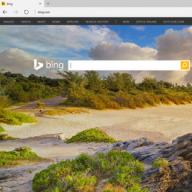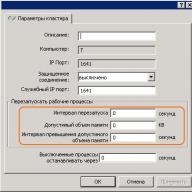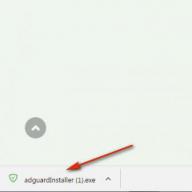I think in today's time, the vast majority personal computers have a connection to the global Internet, and the number of users of the World Wide Web is growing inexorably every year. According to some agencies, now in Russia, the number of users of the global network exceeds 60% of the total population of the country. Therefore, it is not at all surprising that many users, all their main time at the computer, spend on the Internet.
In order to get into the global network, in addition to the physical connection to it, it is necessary special program (a program) that allows you to comfortably browse your favorite websites and the web pages contained on them. Such programs are called browsers (sometimes they are also called browsers), from the English word "browse", which can be translated as "browse".
Despite the fact that almost all modern browsers are free - they are quite complex programs, endowed with large quantity functions, and the development of the most popular solutions involved a lot of specialists. Their main task is to make surfing the net not only comfortable, but also safe.
A LITTLE HISTORY
At present there is enough a large number of different browsers from different developers, but out of their total mass there are five most popular products - Internet explorer, Mozilla firefox, Google chrome, Opera and Safari.
In the late 90s, the main browser for most was Netscape navigator. But Microsoft’s policy has radically changed the balance of power in this area for years to come. It was at this time that it was decided to ship InternetExplorer along with the Windows system, which literally squeezed out all competitors from the browser market.
The Internet at that time was not so developed, and the web pages themselves looked quite simple. Therefore, there was no need for ordinary users to think about the convenience of surfing, the speed of work on the network and the supported standards, and for viewing text pages “behind the eyes” there was enough built-in solution.
Having captured the lion's share of the browser market, the software giant did not calm down and continued to improve IE (Internet Explorer). In 2001, along with Windows XP, its 6th version was released, which for 5.5 years was the main Internet tool for the vast majority of users, and Microsoft itself rested on its laurels, not thinking about releasing new versions of its browser.
It was such a long stagnation that made it possible for competitors to present alternative solutions to users, instead of the tedious Internet Explorer. The Norwegian company Opera, having developed a new engine Presto, introduced the browser Opera 7.0, which many liked and was rapidly gaining popularity. But the biggest “surprise” for Microsoft was the rebirth of the seemingly destroyed Netscape. Its engine was the basis of the Mozilla Suite product, from which Firefox emerged in 2004, which later won a quarter of the browser market from IE.
This trouble for Explorer did not end there. In 2003, Apple on its computers replaced the product from Microsoft with its own brainchild called Safari. And not so long ago, in the 2008th, the search giant Google released its version of the browser - Google Chrome.
Having thrown off such activity on the market, Microsoft began in a hurry to release new versions of Internet Explorer, along with Windows Vista its 7th version was released, and with Windows 7 - the 8th. But it was already late, these versions were not able to compete with their rivals, because their functionality only copied the one that other developers had long used in their products. Despite the fact that the latest 9th version of IE can be called a truly modern solution, the monopoly in this field has been irretrievably lost.
In the modern browser market, among the aforementioned products, a serious struggle has developed for the sympathy of users, who sometimes because of aggressive advertising is not so easy to make the right choice in favor of a particular decision. As you probably already guessed, in this material, we will get acquainted with the main features of the Big Five browsers, and also talk about their advantages and disadvantages.
MAIN CRITERIA FOR ASSESSING BROWSERS
What should I pay attention to first of all when choosing a browser?
Web Standards Support
For the general principles of the global Internet, the World Wide Web Consortium (W3C) is responsible. It is she who develops and approves all existing web standards that all web pages on the Internet must comply with. Therefore, for the correct display of sites and web pages, the browser must maintain the approved web standards and the more he knows them, the better.
To check the compatibility of browsers with certain standards, the most frequently used test program is ACID 3, in which the scored 100 points correspond to full compatibility with all existing web standards.
User interface
The presence of a thoughtful and intuitive user interface is the key to the success and popularity of any browser. Indeed, it is to provide users with convenient surfing the net and is the main purpose of these products. Developers and designers have to seriously puzzle over how to best place all kinds of controls for browser functions. A heavily cluttered interface can be just as uncomfortable as it is superlaconic, so the goal of manufacturers is to find the optimal balance of the layout of elements in the browser window. At the same time, do not forget that user interface It should be not only comfortable, but also outwardly attractive.
Functionality
Modern browsers have become like a small operating system - through them we browse pages with a complex interactive interface, watch movies and listen to music, use them as development tools, download files from the network, use them as FTP clients and much more. Therefore, the majority of users began to relate to the browser not just as a trivial “page viewer,” but as a serious working tool that should have wide capabilities and be convenient in everyday work.
Security
Modern browsers pay close attention to security issues, but, nevertheless, fully protected browsers do not exist. Unfortunately, cybercriminals constantly find more and more vulnerabilities in browsers that can infect users' computers or gain access to their personal data. Developers have to close up the discovered holes with the regular release of updates, and the faster this happens, the higher the security of their product.
INTERNETEXPLORER
We will start with the most popular browser, which has remained such for many years. True in lately this product has lost more than half of its fans, and its usage has dropped to 40% worldwide.
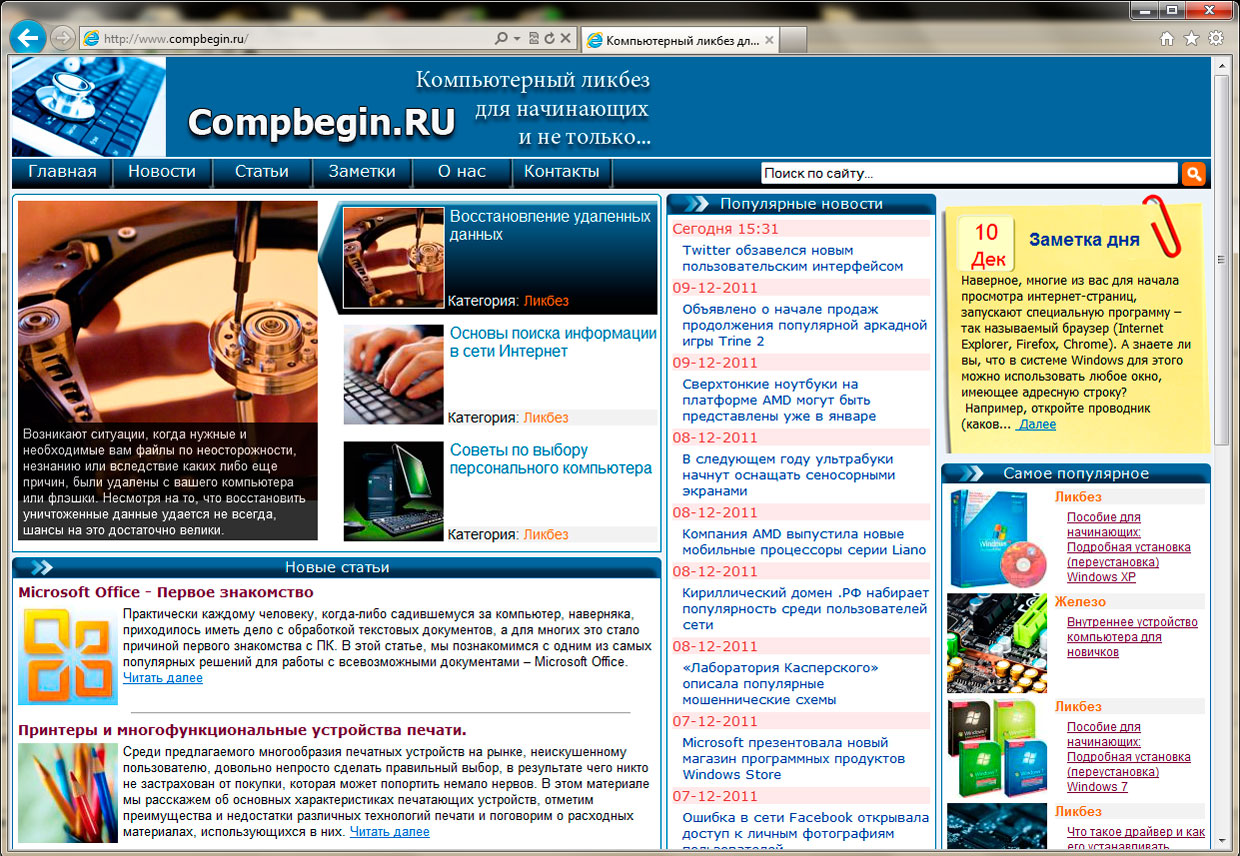
The current version of the browser from Microsoft is Internet Explorer 9. For two years of its development, the manufacturer has done serious work on the bugs, which has resulted in the support of almost all modern standards, including newfangled HTML 5 and CSS 3. In the specialized test ACID 3, 9- The second version of Explorer scored 95 points out of 100 possible. By the way, IE 8 had 20 points in the same test.
To process the multimedia content of web pages, Internet Explorer actively uses the hardware capabilities of the computer's central and graphic processors, which significantly increases its speed.
The interface of the latest version of this browser has undergone a radical revision. Microsoft itself calls it “compact,” because it is based on just one panel where all the necessary controls are located:
- left - back / forward and address barcombined with the search field, including the update and cancel buttons;
- in the center - a panel for tabs of viewed pages, and to the right of them - a button for opening a new tab;
- on the right - buttons to go to home page, favorites and browser settings.
Ascetic panelInternet Explorer 9
Despite such an ascetic design, the new IE turned out to be quite stylish with a catchy design.
The address bar of the browser meets all modern requirements, automatically substituting options from the visit log or from the list of previously visited sites when entering the address itself.
Due to the fact that the entire user interface fit in one line, there is not so much space for tabs, which seriously complicates navigation with a large number of them. True, there is the possibility of transferring the tab bar to a separate line. It is also possible to move any tab to its own window by dragging it to any place on the desktop.
Another interesting point is the ability to pin tabs in the Windows7 taskbar, which subsequently allows you to run your favorite pages, like regular applications.
At the bottom of the browser screen, there is a pop-up prompt line that occurs during certain user actions. At first, it is easy not to notice it and think for a long time why the browser does not take any action on your teams.
The latest version of the browser received a new file download manager and a system for tracking the performance of installed plugins.
Despite the improved protection against malicious sites, it is in the brainchild of Microsoft that they find the most vulnerabilities, and their correction, unfortunately, does not happen quickly enough.
Another drawback of IE is the very meager ability to expand its functionality with plugins, as the code of this browser is not available to third-party developers.
MOZILLA FIREFOX
Pretty long time Mozilla Firefox browser ranked second in popularity among the top five browsers. Today current version has an index of 9. True, it is worth considering that the last five releases are shared by only 7.5 months.

In truth, Firefox 4.0 has become revolutionary among them, having received a new design and a new core. Nevertheless, subsequent versions contain only improvements that improve browser performance, fault tolerance and security.
With the support of all kinds of modern web standards, this browser does not; in the aforementioned ACID 3 test, it scores 100 points out of 100 possible.
Thanks to a modern engine, the overall speed of work new version Firefox has accelerated significantly, including page loading speed and the launch of the application itself. Wherein hardware acceleration graphics allows you to easily view the complex interactive content of multimedia sites.
After some criticism of users, which the developers took into account, starting with the 4th version, Firefox received a new modern interface. In the upper left corner there is a menu button with various settings, and the panel for page tabs has moved up. Below it is a navigation bar, which includes:
- left, back / forward buttons;
- in the middle, the address bar with buttons to add to favorites the viewed pages and their updates;
- to the right is the search box and the home button.
Even lower is the bookmarks bar, where you can keep links to the most visited pages.
The browser is endowed with a smart address bar, which at the beginning of entering the address displays a window with prompts where all matches are marked with a highlighted font. Also, using it, you can go to any open tab.
For the most visited sites in Firefox there is a very useful function of pinning tabs, prescribing them for permanent residence in the left part of the tab bar. After the browser is opened again, this type of tab will always be in its place.

Nevertheless, the main advantage of Mozilla Firefox can be called its rich functionality. The code of this product is open, so the browser has a huge number of various add-ons that make it a real powerful working tool that allows you to solve any problems. Moreover, with the help of special wallpapers and themes, plug-ins, interface settings, tabs and bookmarks, you can transform appearance browser for any of your vagaries. All these joys are on a special site dedicated to add-ons for this browser.

Despite the fact that Firefox is the second browser by the number of vulnerabilities found, they are fixed by the developers quickly enough, which significantly increases the security of user data.
GOOGLE CHROME
Despite its youth, to date, Chrome has broken into second place in the world, ahead of Mozilla Firefox. In principle, this is not surprising, since this browser is the brainchild of the search giant Google, which has in its arsenal a powerful technical base and great financial capabilities.

Today, current version is Google Chrome 17. Such a high index of the product is explained by the choice of a slightly different policy for its assignment - the browser receives it immediately after the developers make any significant changes.
For the support of web standards in the case of this Internet browser, you need not worry, in the ACID 3 test, Chrome shows a 100 percent result.
Speed \u200b\u200bclaims google work Chrome is not. Moreover, according to many experts - this is generally the most fast browser in the world. Thanks to modern WebKit visualization technology, the browser opens pages literally instantly. It also quickly launches complex web applications and 3D-graphics, the processing of which is carried out at the hardware level.
As for the design of the user interface of this browser, it can be called strict and concise. It was Chrome that set the trendy trend for placing tabs at the very top of the window. Under the tab bar is a toolbar called developers omnibar, on which are located:
- Left - buttons forward / backward, update / stop;
- In the center - omnibox - a smart address bar, combined with a search and a button to add a page to bookmarks. At the same time, search results or web page addresses begin to appear as you type;
- On the right is the browser settings and management button.
Even lower you can enable the display of the bookmark bar.
As in Firefox, in Google Chrome there is the ability to pin tabs with the most frequently visited pages, after which they move to the left side of the screen, taking a more compact size.
As in Internet Explorer, there is a pop-up auxiliary line that appears at the bottom of the screen during certain user actions, for example, when downloading files from the network.
Initially, Chrome has built in a fairly large number of useful functions, for example, an automatic translator of web pages or displaying thumbnails of frequently visited sites and launched applications on a special tab called a page quick access. But if you don’t think the browser’s starting functionality is small or you want to transform its appearance, then you have access to many applications, extensions and additional themes that can be downloaded from the Chrome Web Store.
Another undoubted advantage of the product google is the attitude of developers to its security system. Built-in protection against phishing and malware is a good help in the fight against cybercriminals trying to exploit browser vulnerabilities for their own purposes. Also, the automatic update system provides timely installation of patches and various fixes that increase the overall reliability of the security system.
Despite the fact that the Norwegian browser in the world ranking takes the fourth line, far behind the first three, in Russia it is a very popular browser. For several years, Opera has been a favorite among domestic users, and I must say, it is well deserved.
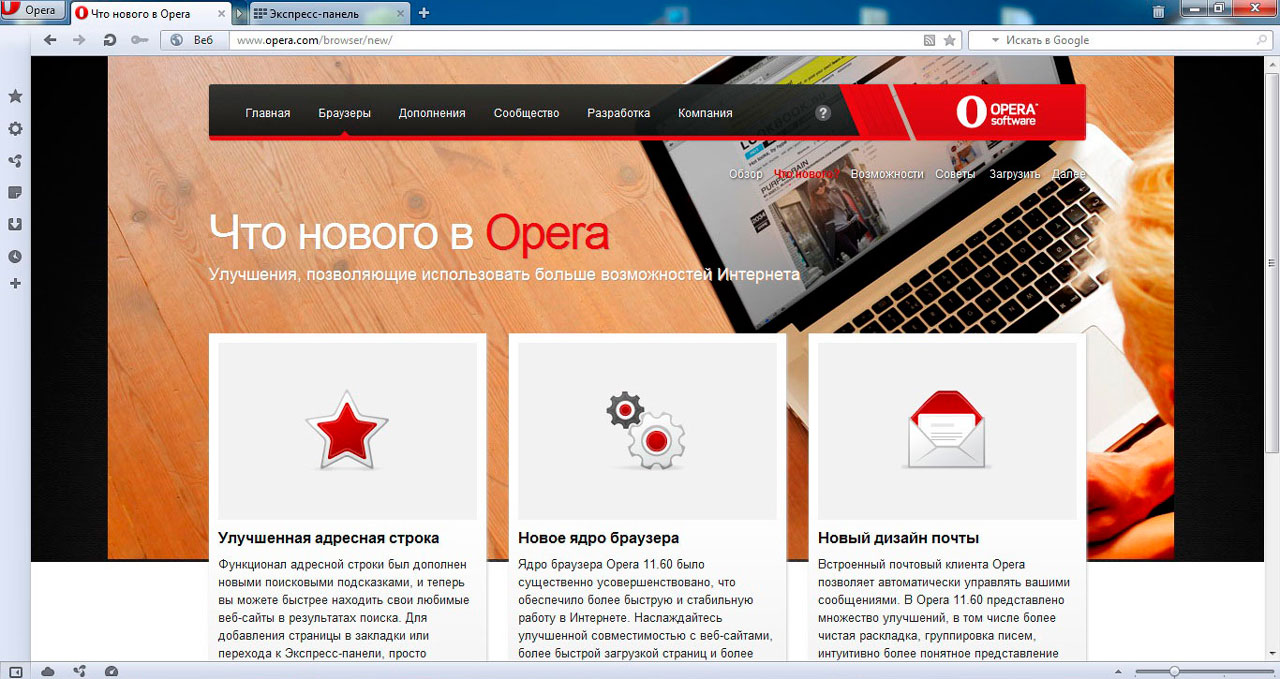
The current version of the browser is 11.6. In the ACID 3 test, Opera shows one hundred percent result, so this browser has no problems with the support of all modern web standards.
The Opera core is constantly being improved by developers, which is the key to fast and stable operation of the browser on the Internet. The speed of opening web pages does not cause any complaints, and for many experts, it is considered a reference. For displaying complex animation in Opera, a specialized high-speed graphic library called Vega is responsible for achieving fast and smooth image processing.
Opera's user interface is somewhat similar to Mozilla Firefox, however, not in terms of design, but in terms of the location of functional elements. In the upper left corner is the button of the main menu, which includes all kinds of browser settings. Web page tabs are traditionally located on top. On the right, on the tab bar, there is a button that reflects the history closed tabs. The toolbar, located below, has the following elements:
- Left - back / forward buttons, page refresh, enter;
- In the center, traditionally, a smart address bar with buttons for a list of RSS feeds and favorites;
- On the right is the search query field.
By default, Opera includes a sidebar display, which is placed vertically on the left and contains buttons: Bookmarks, Widgets, Unite, Notes, Downloads, History and settings of the sidebars. It is also possible to enable the bookmarks bar.
Opera browser has one interesting feature - the ability to group tabs. To do this, just drag one tab to another and a group opening / closing icon appears in the form of a triangle next to them. When you hover over the tab group header, the browser will display thumbnails of all the grouped web pages.
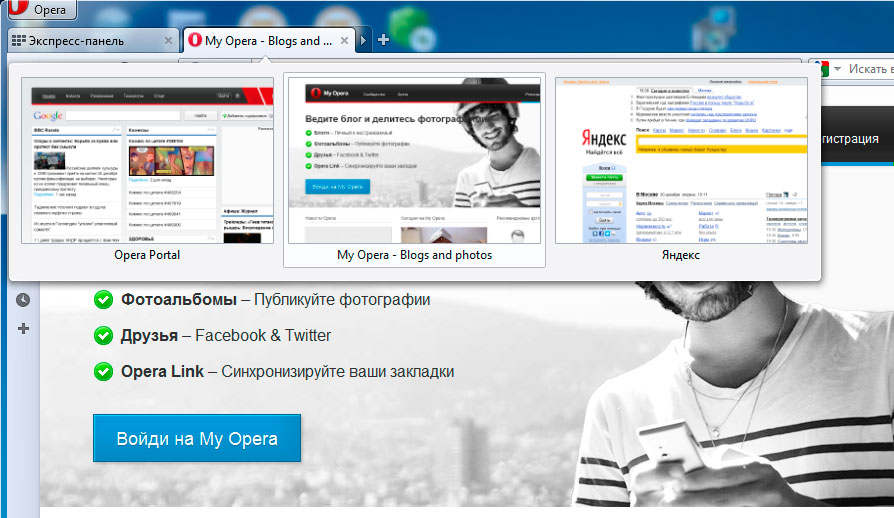
If we talk about the initial functionality of the Norwegian browser, that is, about the features that the browser has immediately after installation, perhaps Opera has the richest ones. The developers have endowed it with such a variety of options that such a gentleman's set is quite capable of satisfying almost all the basic needs of users. It features a download manager, BitTorrent support, spell checking and more. A pleasant bonus for users can be the existence of an express panel - a special page with displayed thumbnails of the most visited sites.
At the same time, the Norwegian developers went even further, and added the ability to further expand the functionality of their product using special mini-applications that are hosted on the Opera website.
Opera's security system is at the highest level. When visiting sites, the browser in real time checks their data and gives a message to users in case of danger. There is the possibility of using private tabs, for example, when working in online banking.
The last browser in our review will be a browser from Apple. It is worth noting that this product is more focused on the market for computers manufactured by the company itself and using the Mac OS operating system. Despite this, its share in the world market is about 5%.

The current version of this browser has an index of 5. Web standards support is organized at the highest level and the ACID 3 test passes Safari one hundred percent.
Perhaps on native systems, Apple’s browser performance is the highest, but in Windows, various tests show average results relative to competitors, which, on the other hand, is not bad at all. The browser supports hardware graphics acceleration, accelerating the rendering of interactive web pages and has an optimized caching algorithm that allows you to load previously visited pages at a very high speed. It is noteworthy that Apple uses the same engine (WebKit) in its browser as Google in Chrome.
The user interface in this browser is slightly different from the four previous ones, which, in general, is not surprising. The appearance of the classic control panel for some users may seem a little old-fashioned, so it has a header, and page tabs are located under all panels. At the top, in the browser header, the name of the page being viewed is displayed. Below is a toolbar that contains mostly familiar elements:
- On the left are the back / forward buttons.
- In the central part there is a smart address bar that starts with the “+” button, which performs the function of adding a page to reading lists, a specialized page that displays thumbnails of the most visited resources and a bookmark bar. In its right part, there are buttons for viewing RSS feeds (appears if it is on the site), Reader mode activation (appears if it is possible), and page updates.
- On the right are the search bar, as well as the menu buttons of the current page and browser settings.
Further, below, there is the bookmarks bar and only below it is the tabs bar, which, when viewing a single page, is not visible at all. In order to add the first tab, you must refer to the corresponding menu item of the current page, which is not obvious to many users. However, after the tab bar appears on the screen, they are added using the “+” button located on its right side.
One of Safari’s interesting features is the Reader mode, which allows you to select the material of an individual article in an independent pop-up window that has its own font size and other text formatting elements. All other site elements in this mode are obscured, allowing the user to focus only on reading specific material.
A very original Safari page is a page of frequently visited sites called TopSites. The developers endowed it with a three-dimensional design, which looks quite stylish and beautiful, however, like all Apple products.

The general functionality of the browser from Apple can be greatly enriched with the help of extensions located on the developer's site. Moreover, if until recently, their bulk was available only to Mac OS users, now plug-ins for Safari are also available on the Windows platform.
It’s quite difficult to clearly say the security of this browser. As already noted, most users of this browser are owners of devices with operating system Mac OS, which is not as popular among cybercriminals as Windows, which means that system hacks through Safari themselves are recorded much less often. And the developers themselves are reluctant to disclose information about the security problems of their product, motivating this with the goals of protecting user data. The company believes that without disclosing and confirming data about certain vulnerabilities in its browser, it will retain confidential information that could be used by cybercriminals to bypass the protection system.
CONCLUSIONS
Developers of modern browser solutions spend a lot of effort and money to please users. After all, it is necessary to take care of many factors that contribute to the successful promotion of your own product on the market. Among them:
- support for web standards for the correct and complete display of web pages;
- convenient and nice user interface;
- a powerful engine that can quickly process pages containing a complex graphical interface, 3D-images, audio and video content;
- ensuring the security of user data.
A few years ago, the position of Internet Explorer seemed unshakable, and only a handful of enthusiasts resorted to using alternative solutions. Today, the situation has changed dramatically. Microsoft's browser has lost all of its advantage, and its popularity continues to melt rapidly. True, we can say that the 9th version of Internet Explorer turned out to be decent, it is faster and more convenient previous versions, and also contains a number of important improvements. The truth is nothing revolutionary, in comparison with competing solutions, he can not offer, which is unlikely to cause a massive influx of users using other browsers now. Although, this version is quite capable of stopping migration to competitors' products.
Google Chrome, despite its youth, has been rapidly gaining popularity recently. Already, many rating agencies put it in second place in popularity, which for many years belonged to the browser Firefox. Developers invest a lot of money and effort into their offspring, which pays off handsomely. According to many analysts, in its arsenal, Chrom has the fastest engine and better system security. At the same time, the browser acted as a trendsetter in placing page tabs on top, as well as combining address and search strings.
Despite the fact that Mozilla Firefox has somewhat lost its position in the world ranking to a competitor from Google, this browser is very popular among users, and in Russia it is a leader in use in desktop computers. The most important advantage of Firefox over its competitors is the existence of a huge number of free add-ons, with which it is possible to radically change the functionality of the browser, its interface and appearance. True, sometimes, for such flexible extensibility, you have to pay increased requirements for random access memory, a slower user interface and browser crashes. IN latest versions of this browser, the developers are doing their best to increase the stability of its work, not only eliminating memory leaks, but also improving the mechanism of its use.
For many years, the Norwegian Opera browser has been one of the most popular solutions among Russian users. Initially, this browser has a very rich functionality and a set of useful services, which makes it an attractive solution for those people who want to get everything they need right out of the box, without resorting to installing add-ons. Without any special drawbacks, Opera’s decline in popularity can only be explained by the activity of competitors who are constantly improving their products, offering equally attractive solutions in this area.
Safari browser being developed apple and initially oriented to use Mac OS in its own operating systems, it’s quite difficult to fight for a place under the sun in the niche of Windows systems. Many experts agree that the performance of this browser on the Windows platform is much more modest than when used in the "native" OS. Nevertheless, it has a fast engine that can cope with tasks of any complexity and its own unique user interface, which has its fans.
For all those who want to see browsers in action, our portal regularly performs large-scale tests of the latest and most popular versions of Internet browsers, the last of which you can familiarize yourself with.
Despite the fact that the browser is a product that many people work on creating, and a lot of money is invested in its development, it remains free, which gives users the opportunity, if they have the desire and time, to get acquainted with all the main solutions in this field.
Internet browser - (abbreviated browser) a program for viewing electronic pages on sites that implements the input of any data, manipulates them, and also performs navigation between pages. The browser processes the HTML code (hyper-markup) and based on it displays the information in a user-friendly way.
Also, this term can be referred to as:
- bro uzer - outdated;
- internet (WEB) browser - in English;
- Web browser - alternative name;
- Web browser - It is used mainly in school (institute) circles.
- hfepth - a typo.
All these names mean one thing - it’s browser! It can be safely used without any prefixes, since in no other area the word " browser»Not applicable.
Browser history
| date | Event |
|---|---|
First NCSA Mosaic Browser Released |
|
The first version of the Netscape Navigator browser has been released, based on the NCSA Mosaic. |
|
Opera browser in the ranks, but far behind and with a very small audience. |
|
In the struggle for the Internet market enters internet browser Explorer |
|
It turns out the browser Internet Explorer 3.0, which became part of the operating system kernel windows systems. The core of the IE 3.0 software core was written by programmers hired from Spyglass based on Mosaic. |
|
Start of war netscape browsers Navigator vs. Internet Explorer. . |
|
Netscape was unable to withstand the onslaught of Microsoft, and the browser war was almost over. Completely free internet Explorer captured over 90 percent of the market. Netscape has made its source code publicly available. |
|
since 1999 |
Due to the exclusive market of Internet Explorer (version 4, 5, 6), practically nothing has changed. Internet Explorer 6.0 is the longest lived, which lasted more than 5 years until the next update. Throughout history, no one has managed to hold out for such a period. It is worth noting that for its time it was a really good browser. |
The first release of the FireFox browser. |
|
Enters competition with its Google Chrome. |
|
2009 (beginning) |
Microsoft announces the creation of a new browser, Gazelle, but nothing practical happened. Continued to develop IE due to tight integration into the core of the Windows operating system since 1996. |
The Russian government has announced that it will create its own browser for its needs. All users laughed together. Money allocated, no browser - everything is natural. |
|
|
All browsers are switching to an automatic update system for their own versions due to the speed of the Internet and the emergence of phishing sites. |
|
|
This year, the final version race begins, so many rating agencies that monitor browser versions stop accounting for these versions and now there are only browser names. Chrome, FireFox, Internet Explorer and so on. The percentage of popularity of Internet Explorer reaches 10%. Microsoft is trying to catch up with the leaders - to no avail. Another slogan: “Now even faster, safer, even cooler” does not work. Television advertising - money down the drain. Popularity continues to fall, as from version to version it is not possible to catch up with the leaders. |
|
Where to download the browser (download browsers)
| Browser | Core | For Windows |
For Linux |
For Android |
For Mac iOS |
For Tablets |
For mobile phones |
|---|---|---|---|---|---|---|---|
Blink (Chromium) |
|||||||
WebKit + Trident |
|||||||
WebKit (Chromium) |
|||||||
Blink (Chromium) |
|||||||
Blink (Chromium) |
Free browsers
It is important to note that today absolutely all browsers are free and are downloaded for free. Repeat: all browsers can be downloaded without SMS. If during installation you are asked to enter a phone number or send an SMS somewhere, then this is.
For free, many thanks to Microsoft. It was thanks to the browser war that the main striking force in the victory was the pricing policy, or rather, Internet Explorer was distributed completely free of charge. This killed all paid browsers that charged at least some fee for using their product. Here is such a result of competition.
But do not think that browsers are such a noble occupation for altruists. The creators of browsers earn and not sour. On what? On a lot. From selling user information to embedding a default search. Since 1996, you have been reporting your interests to your browser.
No, we are not talking about the sale of personal data, although some browsers also hunt for it, since it costs many times more, namely the sale of user interests. for instance: more often ask balloons reds, but not pink. Thus, you can increase your sales by focusing sales on red balls.
Example 1.
Information for company “B” is on sale about how many users are interested in a particular brand of car. Any interested company will give a ton of money for such information. Because the organization will earn on this many times more.
Example 2
When installing a browser with Google search (by default), the company pays the browser manufacturer from $ 0.50 to $ 2.00 for one installation. Now count how many browsers are installed and how many search engines. Many? Therefore, it’s a sin to take payment from users as well.
There are other ways to make money. So altruism can not be invoked.
Browser rating for 2014
Browser Rating by Popularity (TOP 5)
In this case, StarCounter has less credibility, as their audience reach is significantly less than that of w3schools.
Many people look at the statistics of Net Applications, where according to their data Internet Explorer still has a popularity of more than 50%, although even Microsoft in 2012 acknowledged that their browser rating dropped below 50%.
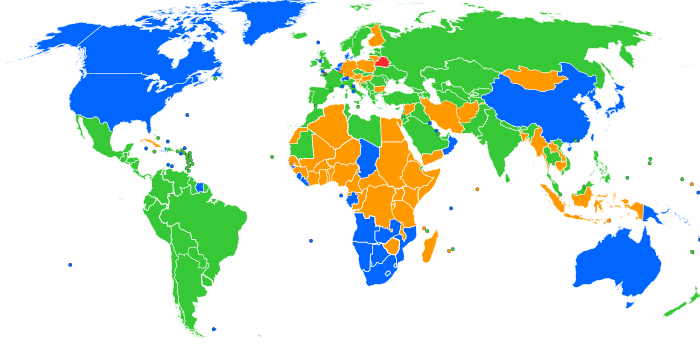
- Internet explorer
- Google chrome
- Firefox
- Opera
Security Browser Rating
| Chrome | Firefox | Internet explorer | Opera | Safari |
|---|---|---|---|---|
Browser Speed \u200b\u200bRating
| Speed \u200b\u200bparameters | Chrome | Firefox | Internet explorer | Opera | Safari |
|---|---|---|---|---|---|
| Average load time (in seconds) | |||||
| Average navigation time (in seconds) |
Extensions for browser (s) are the most popular
| Extension picture | Description |
|---|---|
|
This extension is the most popular for all browsers. Its main task is to block numerous advertisements on sites that are teeming with banners, and the useful material is becoming less and less. Lately search engines, such as Google, oppose this extension and block the installation of this plugin. Reason: in addition to blocking really stupid ad networks, the extension also blocks the Adsense and Yandex Direct ad networks. At the same time, depriving good information sites (which are not full of banners) is really the lion's share of profit. |
|
|
E-mail, as well as traveling around the Internet, is an integral part of it, but many people do not like to keep open a large number of programs constantly, and often do not need it. But to control email I want many and constantly. Therefore, this extension is popular because it allows you to check mail every minute for all mailboxesthat you have. |
|
|
The most popular extension for people who get confused while driving a business or business lifestyle. At any time, it allows you to make notes both in text and in graphical form (pictures, screenshots). A fairly convenient browser notepad with cloud-based data storage technology. |
|
|
To be honest - a stupid plugin, for it is enough to look out the window and find out what the weather is. But strangely enough, almost every second user downloads this plugin. It shows only the current temperature (+ -2 days). To look further, you still need to go to the GisMeteo website. It’s better to have a bookmark on GisMeteo. |
|
|
If you plan to keep abreast of all the events in the areas that interest you, then this plugin is for you. It accumulates news feeds (RSS) from all sites that interest you in one single place. Thus, you will be in the know about everything that interests you. |
The future of browsers is coming soon
- Big integration with cloud services is expected.
- More and more progress towards capturing the mobile market.
- Integration of the maximum number of applications directly into browsers.
As IT visionaries stated in the past, everything is moving towards the fact that only a browser will be on your computer and nothing else. Actually this is signaled by new products like Chrome OS and Mozilla OS.
Types of Browsers
Full Screen Browsers
Media Browsers
Microsoft Internet Explorer
Disadvantages of Internet Explorer
Opera
Netscape navigator
Mozilla
Alternative browsers
Browser prevalence
Conclusion:
Browser
Browser(from the English. browse - browse, flip) - this is a special program that allows you to view the contents of the Internet. It allows you to access all the information resources of the network. Using a browser, you can view and download pictures, sound and video files, various text information (e-books, news, magazines, jokes), etc.

Command line mode browser. This type includes the earliest browsers. They do not provide the ability to view text and graphics. Such browsers only support moving using digital addresses (IP). Currently, they are practically not used, so we will not consider them in detail.
Full screen browser. A text browser without support for multimedia (pictures, animation, etc.) Internet resources. Using it, you can view only text and links.
Media Browser. The most common and popular browsers today. They allow you to work with almost all types of information presented on the Internet.
Add-on Browsers. They are add-ons for full-featured browsers. Most often, add-on developers use Internet Explorer. Add-ons use the “engine” of this browser to display sites. Therefore, their capabilities in this area are completely identical with Internet Explorer. Add-ons just change the interface and add some features that Microsoft developers have ignored.

Since most users are accustomed to surfing the Internet using multimedia-enabled browsers, do not completely forget those that display only text. Of course, browsers of this kind are rarely used, but their page loading speed is impressive. Without graphic and design elements, as well as without tables, many pages load almost instantly. One of the most popular full-screen browsers is Lynx, which is part of the Lynix operating system. Let's consider it in more detail.

Lynx is a very convenient browser, easy to configure, fully Russified. Distributed on disk bundled with the Lynx operating system. Therefore, the vast majority of Lynx users work in a Lynx environment.
The undoubted advantages of this browser is that it can work on very old computers, as well as a significant acceleration of page loading time due to the lack of graphic elements and pictures. The latter quality can not always be considered an advantage, but if you need to go to a page on the Internet only to evaluate its content, then sometimes it is worth using Lynx. Moreover, it works great "paired" with a browser that supports graphics

The most common and informative browsers. 99% of global Internet users use the capabilities of these browsers intensively and everyday. Most used: Internet Explorer, Opera, Mozilla, Netscape Navigator. Below we will consider each of them in more detail, but first a brief history of the creation of such browsers.
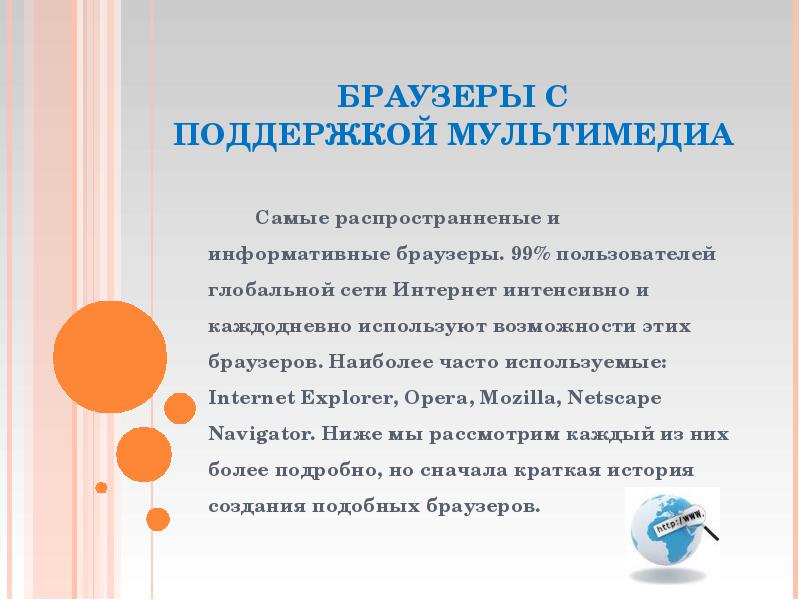
Internet Explorer is the most popular browser in the world and the undisputed leader. You do not need to specifically install it, since it is included in the standard package of any of Windows.
Changes from one version to another have almost no effect on the interface; they are rather aimed at the core of the program.
Microsoft's browser is really very powerful, with rich features. It has a convenient and user-friendly interface, familiar to all Windows users, which is a great advantage over competitors.

Internet explorer
Internet explorer
This browser has a lot of advantages and capabilities, and with each new version it becomes even more.
today it supports absolutely all the technologies used to create sites. These are all kinds of multimedia clips (video and audio), data encryption in electronic commerce systems, various hypertext markup languages \u200b\u200b(HTML, XML, etc.). Internet Explorer works correctly with the vast majority of existing sites. Therefore, the user of this browser is unlikely to be able to meet a site that does not display correctly.

Disadvantages of Internet Explorer
The browser in question does not have multi-window mode. Many users, of course, do not suffer from this, but there are people (mainly professional designers, webmasters and programmers) who would benefit from the multi-window function.
Unsuccessfully implemented functions for storing information from the Internet.
Very inconvenient disabling graphics when browsing sites - you need a very long walk on the menu to put the desired checkmark in the settings.
This browser relatively slowly processes and displays the pages of sites. However, this is also debatable. For users whose Internet connection is very fast (cable and satellite Internet, leased line), this drawback does not play any role. But if you still remember the people who use slow communication lines (dial-up telephone lines), which are the majority in Runet, this disadvantage may turn out to be significant.
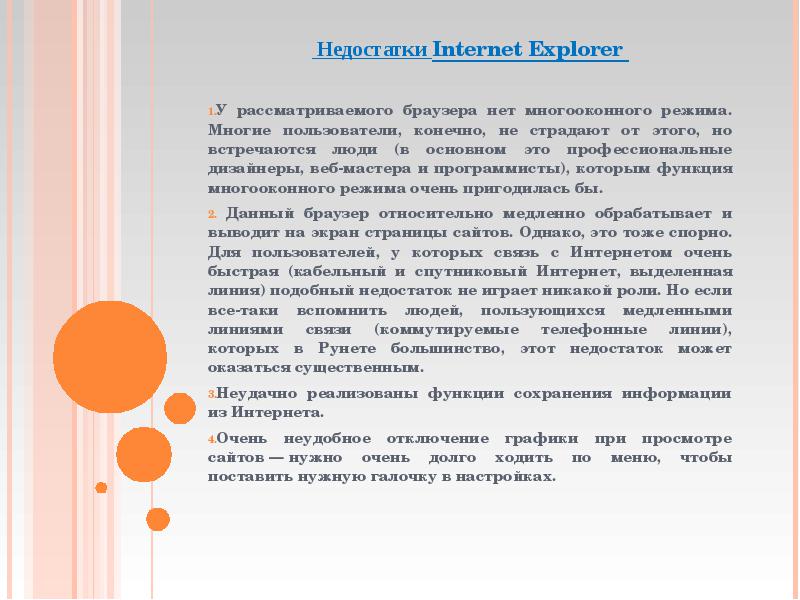
Opera is the main competitor of Internet Explorer. Browser
Opera has a very large number of advantages that competitors do not have.
It is the fastest browser in the world.
This browser takes up very little disk space and requires a minimum of system resources. Opera's motto is: “More features - less size.”
Another advantage of this browser is its almost completely customizable interface. The user can change any part of it at will. It is worth noting that Opera is a multi-window browser.
The Opera browser has many useful additional features. In particular, when you open the page, it determines the speed of information transfer and the percentage of already downloaded data.
Opera allows you to quickly, with the click of a button, turn off and on again the display of graphics on the site. This browser also has very good page caching.
Convenient bookmark list.
All commands are duplicated on the keyboard, you can change the scale of the document from 20% to 1000% ... This list of advantages can go on and on.

The browser is distributed for a fee.
Insufficiently reliable scripting. Despite the stated support for Javascript, sometimes there are overlays. Many other modern Internet technologies are not available for this browser.
Another significant drawback is the lack of support for some Russian encodings in English versions. You have to go to all kinds of technical tricks and download additional components,
to work fully.
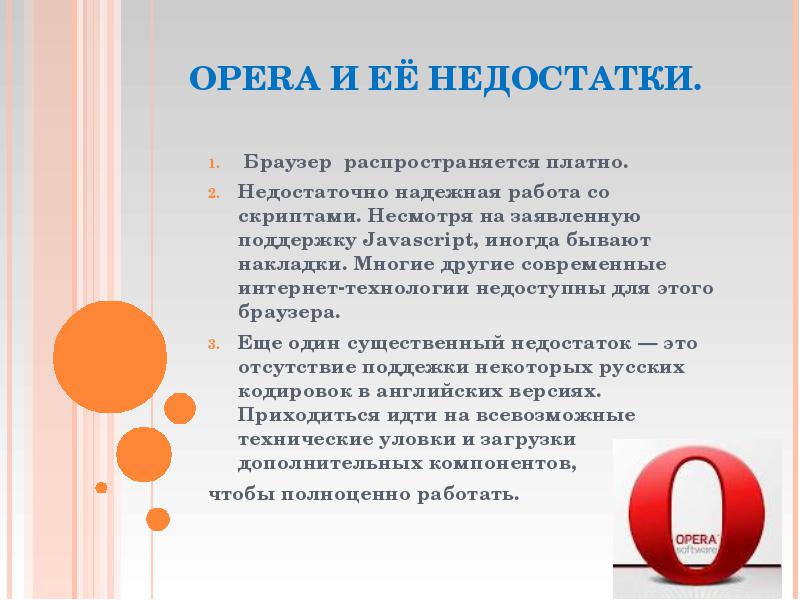
Netscape Navigator was once a real competitor to Internet Explorer. However, since then he has seriously lagged behind his competitor. The reason for this is Microsoft's successful advertising and embedding Internet Explorer in Windows.
In addition, Netscape Navigator developers were late in the period of active development of Internet technologies with the release of a new version that supports the latest developments in this area. And when this version nevertheless appeared, it turned out to be incomplete, with many shortcomings and “holes”. This made even his fans abandon this browser.
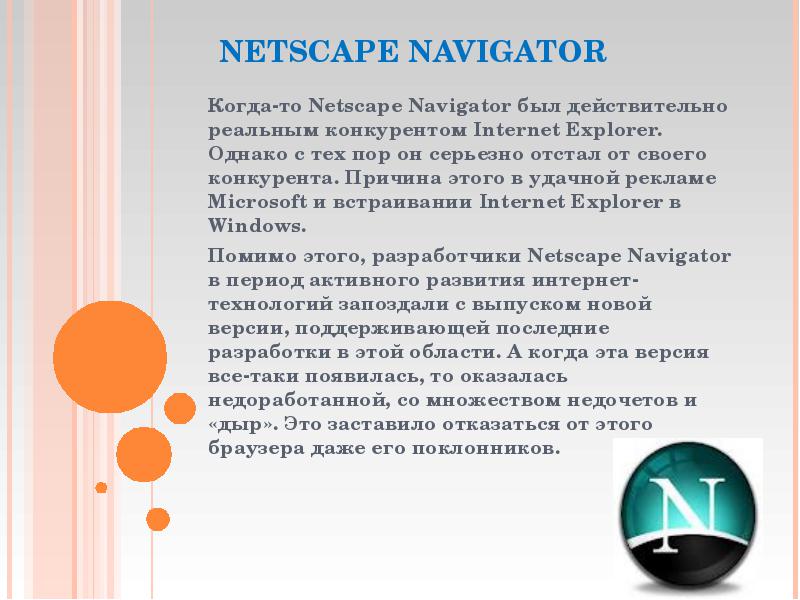
Netscape Navigator often incorrectly displays many sites. And this applies not only to complex dynamic, but also simple text pages.
Netscape was announced back in 2001, as it is obvious that there is no point in competing with Internet Explorer. Opponents of Microsoft products make up a small proportion of users, many of them do not work with Windows, so the logical choice for them would be not Netscape, but the Mozilla browser underlying it.
The creators of Netscape Navigator in the latest version have built in a lot of additional utilities - an email client, a utility for communicating via IRC channels and a multimedia player, and much more. Because of this, the browser distribution has become very large. Plus, Netscape Navigator starts up very slowly and takes up a lot of system resources, since every time it loads all its utilities and components.
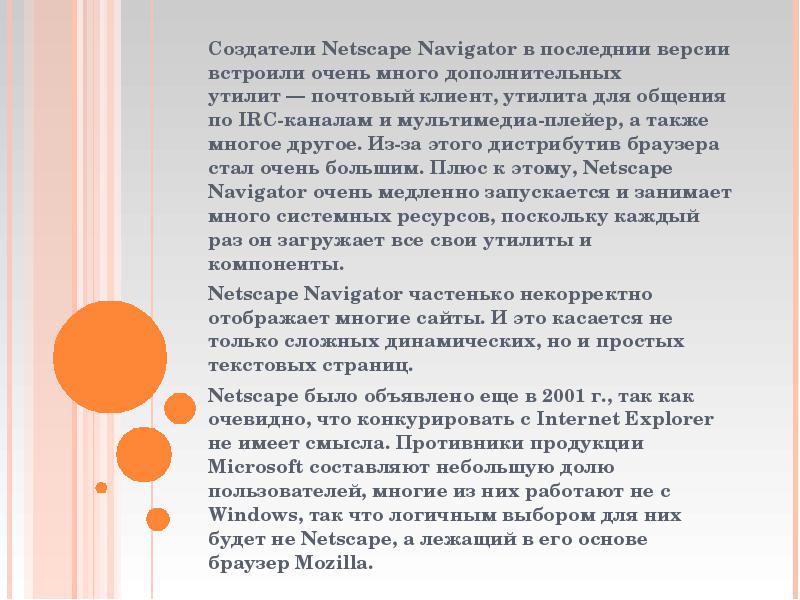
The source code for the Mozilla browser is already highly praised by the developer community. However, Mozilla is inferior in its capabilities to Netscape Navigator. But this applies only to that part of the program that is not directly related to
viewing the contents of the Internet: of the additional utilities in it there is only an email client. But it’s just like the Mozilla browser
not inferior to Internet Explorer.
This browser appeared recently - at the end of 2001. A first introduction to Mozilla shows that it is very similar to Netscape Navigator. Although there are some changes in the organization of the menu. The similarities between Netscape Navigator and Mozilla are far from accidental. In April 1998, Netscape Communications, an independent company at that time, decided to redesign its popular Navigator browser, transferring it to the Gecko html page rendering engine and turning it into an open source project. Thus, the company attracted a wide range of developers interested in modifying and distributing the Netscape source code to develop the browser.
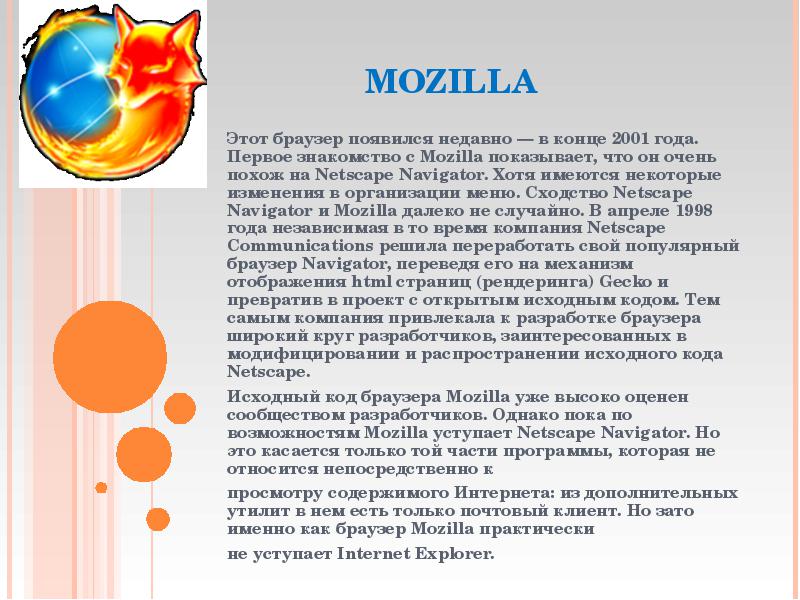
The main advantage of this browser:
multi-window and speed.
conveniently, it implements the function of saving information from the Internet.
many plugins that extend the functionality of this browser. Moreover, people familiar with programming can add these additions themselves. The fact is that the source code of the Mozilla browser is open and accessible to anyone.
The disadvantages include:
non-standard and unusual for the average user interface compared to Internet Explorer.
Some functions in it work differently - not at all as it is in Windows.
an important drawback is the incorrect display of some dynamic sites. Sometimes there are sites that are not displayed on the screen as we would like.

Netsurf - the main emphasis is on functionality and speed; the interface is quite simple and convenient.
Konqueror - file manager with the function of viewing pages on the Internet; Russified, works with many encodings.
Neoplanet - the ability to change the appearance of the browser through the use of skins, you can make your own; English interface.
MyIE2 - turns Internet Explorer into a multi-window browser; function that blocks the display of banners on pages and the opening of pop-up windows; Allows you to enable or disable the display of graphics on viewed sites with the click of a button.
Internet Surfer - takes up very little space; convenient multi-window interface; often reduce the stability of the system and lead to various errors; most convenient add-ons are paid.
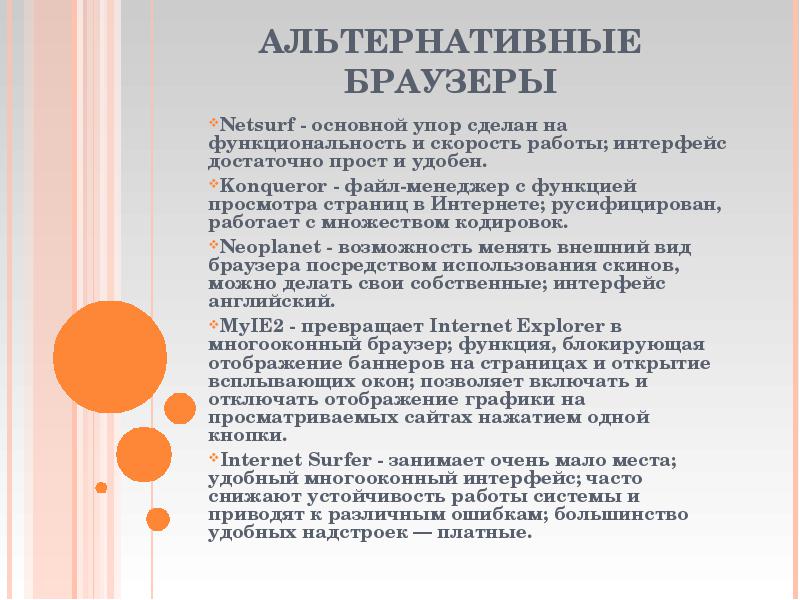
According to Spylog (these are millions of users) for the period from August to September 2004, the first 20 most popular browsers look like this:
99% of Internet users use the Big Four browsers: Internet Explorer, Opera, Mozilla, Netscape Navigator. The remaining (alternative) accounts for no more than 1%. And it's no secret that the most common given time (and in the near future) is a browser from Microsoft - Internet Explorer. If you look at the most recent research on the prevalence of browsers, the superiority of IE is so significant that not even the most fresh versions This browser leaves almost no hope for its co-workers.

Choosing a browser is one of the important positions of the Internet review. Many aspects depend on which browser you use, such as: speed of work, security of your computer, usability, support for modern technologies, etc. I believe that it is necessary to try everything and choose the most suitable browser for all parameters. In addition, all browsers must be installed on the computer, because some sites are designed taking into account the functional features of a particular browser.


